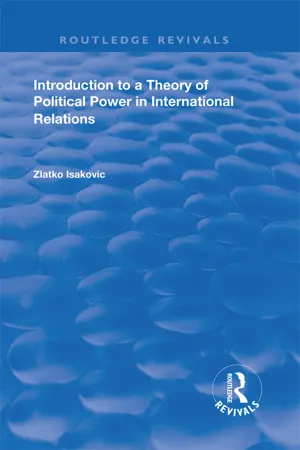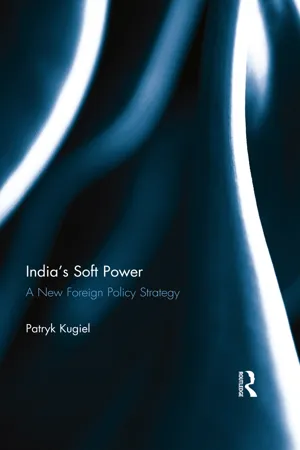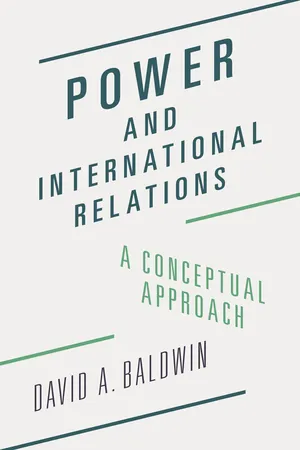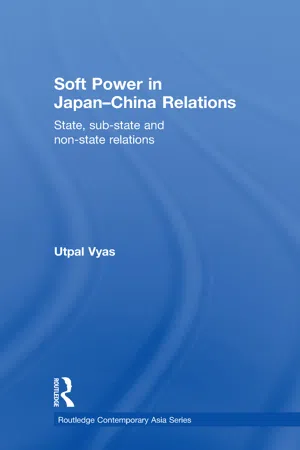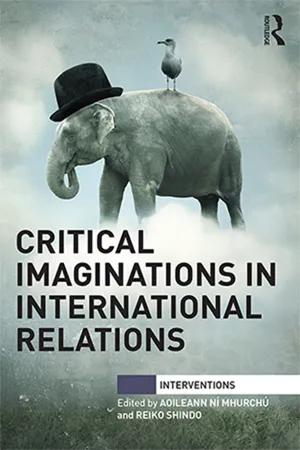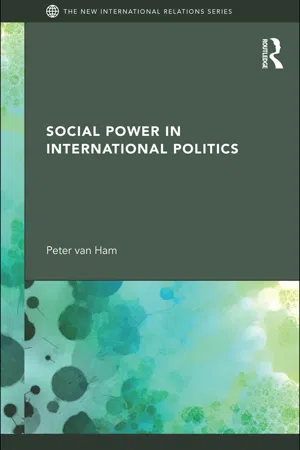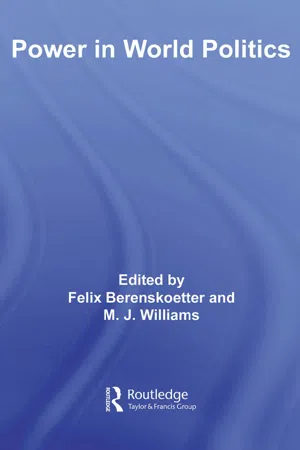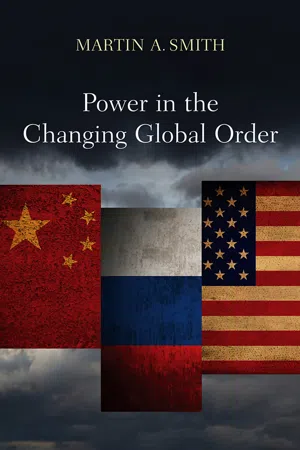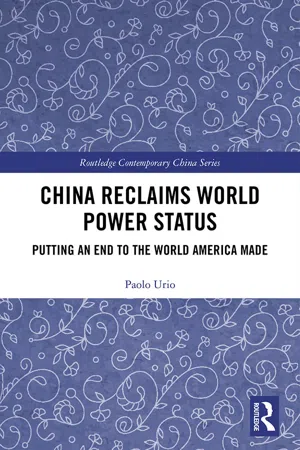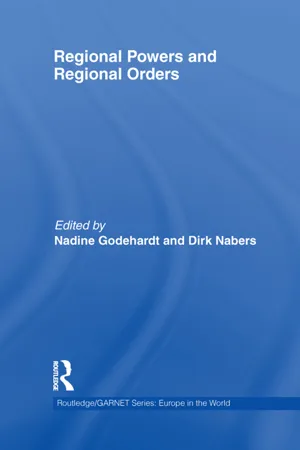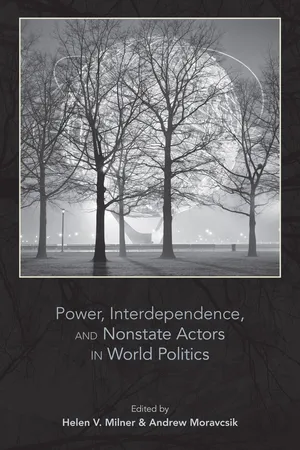Politics & International Relations
Power in International Relations
Power in international relations refers to the ability of a state or actor to influence the behavior of other states or actors. It can be exercised through military, economic, diplomatic, or cultural means. Power dynamics in international relations shape the behavior of states and the outcomes of international interactions.
Written by Perlego with AI-assistance
Related key terms
11 Key excerpts on "Power in International Relations"
- Zlatko Isakovic(Author)
- 2019(Publication Date)
- Routledge(Publisher)
Deutsch departs from the fact that all states (not only superpowers) have some power enabling them at least partly independent social development, but lesser territorial scope. Superpowers, on the one hand,Aron defined the phenomenon of power as the 'ability possessed by one man or group to establish relations conforming to his or its wishes with other people or groups' (1972: 176).wield influence (or coercion if influence is ineffective) and, on the other hand, they are much more dependent on the external environment than some small states... Interdependence, however, obviously creates a sort of hierarchy of states in view of the scope, range and domain of each of them, which in political relations transforms into political influence that may be voluntarily accepted, but may also lead to establishing hegemony or another form of domination (Stojanovic, 1982: 76-8).Kissinger distinguishes between offensive power (the ability to impose will on others), defensive power (the state's ability to avoid or defend itself from others intending to impose their will on it) and deterrent power (ability to reply to threat by great risk, noting that it will be responded to reciprocally or by even greater force). He also distinguishes between power wielding influence by force and power affecting international relations without applying force (1965: 5).Russet and Starr are of the opinion that Power in International Relations simply represents 'the ability to achieve what one wants' (1985: 130).Holsti maintains that A can be said to possess more power than B in regard to a specific thing if A can influence B to do something, but B cannot succeed in making A do a similar thing. On the other hand, if A tries to influence B's behaviour, it is almost impossible to find a situation in which B has no opportunity to affect A's behaviour (1972: 156).Dimitrijevic and Stojanovic are of the opinion that power can be defined as the 'degree of ability to compel or force other actors to behave as the power possessor wants them to' (1988: 384), i.e. as 'an accumulated ability to produce changes' (Stojanovic, 1981: 81). From the valueless cybernetic point of view, power is the 'degree of probability that the outcome will be the one desired by the actor' (Dimitrijevic, 1978: 154).- eBook - ePub
India's Soft Power
A New Foreign Policy Strategy
- Patryk Kugiel(Author)
- 2017(Publication Date)
- Routledge(Publisher)
This chapter examines the basic features of soft power and addresses the most important controversies surrounding the term: What constitutes soft power resources? Where does soft power start and hard power end? What is the relationship between the two? How does soft power work and how can it be implemented effectively as a state policy? How can soft power be measured and how can it be made more efficient? In unravelling these questions, the chapter arrives at a broader definition of soft power that includes not only intangible resources but also tangible assets and behaviour that makes countries attractive and legitimate. In doing so it adjusts the concept to better accommodate it in India’s context.Concept of Power in International Relations
The idea of soft power has evolved in opposition to the dominant discourse of realism in the theory of international relations, which emphasises the roll of a state’[s hard attributes in its pursuit of foreign policy aims. In this school of thought, which can be traced back to thinkers such as Thucydides, Niccolò Machiavelli or Thomas Hobbes, the international system is seen as anarchic, and the principal actors are unitary, self-interested rational states that compete with each other for survival and influence. In order to defend their security and attain other national interests, these self-help-system states tend to accumulate power. Therefore, power becomes a central notion in realism, regarded both as an objective of state policies and a means through which they can influence other actors to act in a desired way. Power is seen as a capability to coerce others to do what one wants, or to do what, in other circumstances, they would not (Dahl, 1961).According to realist scholars, power is understood in terms of material resources. Kenneth Waltz (1979: p.131) lists these resources as consisting of the “size of population and territory, resource endowment, economic capability, military strength, political stability and competence.” According to Robert Gilpin (1981: p.13), power is “the military, economic and technological capabilities of states.” For John Mearsheimer (2001: p.55), “power is based on the particular material capabilities that a state possesses,” of which the most crucial are military assets. Although over the years more emphasis was put on economy or technology(rather than just military strength)—in determining a nation’s power, realists tend to focus on tangible and measurable resources.This is not to say, however, that realists have completely ignored the importance of ideas and perceptions in international affairs. Leading scholars, from E.H. Carr – one of the main representatives of classical realism, to Kenneth Waltz – the founder of the neorealist theory, recognise the role of morals and believe in foreign policy. They are aware of the material power’s limitations and agree it is not the best way to exercise power in all situations, pointing at the power of opinion. Hans Morgenthau, a renowned American foreign policy realist, writes about “the significance of a policy of prestige in an anarchic world” and claims that states should “be alert to international morality and world public opinion in order to maintain their international status” (Lee, 2010c: p.13). - eBook - ePub
Power and International Relations
A Conceptual Approach
- David A. Baldwin(Author)
- 2016(Publication Date)
- Princeton University Press(Publisher)
Despite the infinite variety of means available, he added, writers on international politics have “usually given a primary weight to military force and military potential” (133–39). Inis Claude’s Power and International Relations (1962) begins by acknowledging that power may be defined broadly to include a “variety of means by which states may pursue their purposes and affect the behavior of other units” and supports this acknowledgment by citing Lasswell and Kaplan’s Power and Society but “nevertheless” confines use of the “term power to denote what is essentially military capability.” For Kenneth Waltz (1979, 113, 186), international politics is a realm in which “force serves, not only as the ultima ratio, but indeed as the first and constant one.” He declares that “the use of force and the possibility of controlling it have been the preoccupations of international-political studies” ever since “Thucydides in Greece and Kautilya in India.” Although the end of the Cold War caused many IR scholars to question the preoccupation with military power, 17 the emphasis on military force in the study of international relations remains strong. For example, a RAND Corporation study purporting to offer a “comprehensive framework for evaluating the national power of countries in the postindustrial age” focused on “the one element that is still fundamental to international politics: effective military power” (Tellis, Bially, Layne, and McPherson 2000, xi, 177). Also, a study entitled War and the State carried the subtitle The Theory of International Politics (Wagner 2007). “The central question debated by students of international politics,” the author began, “is the relation between organized violence and political order at the global level” (ix). No one objected to this continuing preoccupation with military power more strongly or more often than the Sprouts - eBook - ePub
Soft Power in Japan-China Relations
State, sub-state and non-state relations
- Utpal Vyas(Author)
- 2010(Publication Date)
- Routledge(Publisher)
It is necessary to recognise that there are different kinds of power, and different ways in which it can be used. Additionally, power is not always a one-way process; its use will always have consequences or side effects upon the user. If an idea of consensus power is adhered to, logically it is not possible for an actor to use power without this power also affecting the user. Thus, the way in which power is defined in international relations also depends on the view taken of what kinds of power exist, and how states or other international actors interact using those kinds of power. In general, it can be said that international relations scholars’ often conservative views of power have been influenced by the prevailing general theories within the field. Therefore, in order to evaluate ways of thinking about Power in International Relations, and although it has been noted that ‘agreement on the core premises that underlie either of these traditions, or international relations theory generally, does not exist’ (Kegley 1995: 3), these prevailing theories’ points of reference regarding forms of power will be considered in turn.Realism and neorealism
Traditional realism centres on the idea that the basic condition of the world is anarchy, and therefore that units of people must help themselves to survive. The most important units in the contemporary world are states, or nations. States look after their own interests and conduct their policy according to a narrow definition of national interest. Therefore, ‘international relations is not a constant state of war, but it is a state of relentless security competition, with the possibility of war always in the background’ (Mearsheimer 1994: 9). Such comments as these show that realists see the main source of power as being military power (Dunne and Schmidt 2001), with any other forms flowing from this. Stability in the international system can only be maintained by a ‘balance of power’ between states. These ideas have left little room for consideration of other softer forms of power, and the idea that only coercive forms of power are of any use within the international system has become ingrained in the minds of Western politicians, diplomats and many academics over centuries. As an adjunct to this, the concept of power itself has come to be seen as realist, without due consideration of other ways of viewing it (Barnett and Duvall 2005). - eBook - ePub
- Aoileann Ní Mhurchú, Reiko Shindo(Authors)
- 2016(Publication Date)
- Routledge(Publisher)
11 Power Rita Abrahamsen DOI: 10.4324/9781315742168-11The concept of power is at the heart of International Relations. Since its inception as an academic discipline, power and the varying capacities and abilities of states to wield it have defined and animated debates, as evidenced by terms like the balance of power, super powers and hegemony. Rethinking the concept of power was equally central to the critical turn in IR, and a more complex, dispersed and relational understanding of power now informs diverse approaches within the discipline. This chapter begins by explaining how the concept of power has traditionally been understood and employed in IR, before contrasting this with less state-centric, non-sovereign conceptualisations. It shows how Foucault’s insistence that we need to move away from the obsession with sovereignty, or in his words, to ‘cut off the King’s head’ (1980: 121), has spurred more multifaceted understandings of the technologies and effects of power and also helped challenge the Western-centric character of much mainstream IR. By focusing on the North–South relationship – an issue area where the rethinking of power has been particular influential – the chapter shows how the discipline of IR is not merely describing the world, but also helps produce and maintain it. It argues that an understanding of power as productive and as governmentality is crucial to an appreciation of contemporary global politics, but also underlines the continued relevance of coercive power.Power as domination and persuasion
In everyday parlance, as well as in much political science and IR, power is understood primarily as the ability of actors to influence and determine the actions of others, or as a form of domination and compulsion. A classic formulation of this view comes from Max Weber, who defined power as ‘the probability that one actor within a social relationship will be in a position to carry out his own will despite resistance, regardless of the basis on which this probability exists’ (1947: 52). The most influential definition, however, is undoubtedly Robert Dahl’s statement that power is the ability of A to get B to do what B would not otherwise do (Dahl 1957 ). Power, in other words, is coercive and intentional, and B is compelled or forced to act in a particular way; if someone mistakenly changes behaviour because they believe this to be what A wants, it does not in Dahl’s definition count as an exercise of power. This requirement of intentionality has been challenged in later engagements with Dahl’s claims. Bachrach and Baratz (1962) , for example, drew attention to non-decision as a form of power and suggested that intentionality is not a definitional requirement of power. Instead, power is also present in the ability to shape and control political agendas, thus preventing issues from entering public debate. In this way power can be exercised even when A is unaware of its effects on B, an aspect that is also stressed in Barnett and Duval’s important contribution to debates about power in IR. As they highlight, victims of ‘collateral damage’ certainly experience the power of the state behind bombing campaigns, even if that state did not intend to cause such damage (Barnett and Duval 2005 - eBook - ePub
- Peter van Ham(Author)
- 2010(Publication Date)
- Routledge(Publisher)
The debate about power is ongoing, and remains central to the study of international politics. 7 The godfathers of the discipline of international relations (IR), like E.H. Carr, Hans Morgenthau, Kenneth Waltz, and Karl W. Deutsch, were all primarily concerned with the working and distribution of power in the international system. Going further back in time, the philosophical roots of IR can be found in the classical works of Thucydides, Machiavelli, and Hobbes, whose tracts on war and conflict tried to answer the key questions: what is power and how can, or should it be used? Today, the debate about power is predicated on the understanding that the character of international politics is changing, and that we are moving away from classical state-based authority towards “global governance.” 8 As David Held has it, “we must recognize that political power is being repositioned, recontextualized, and, to a degree, transformed by the growing importance of other less territorially based power systems.” 9 But radical change is not limited to the sphere of international politics. Social scientists remind us that power is all around us. No one can escape power relationships, since we all influence each other and are in turn influenced by others. Since the most common definition of power is the sense of someone getting someone else to do something they would otherwise not do, we are confronted with power within the family, as consumers, voters, lovers, and in all other social relationships. 10 Why we buy a certain product, support a certain presidential candidate, or accept a foreign country’s political leadership, all boils down to the power of branding, spin-doctoring, or loyalty - eBook - ePub
- Felix Berenskoetter, M. J. Williams, Felix Berenskoetter, M. J. Williams(Authors)
- 2007(Publication Date)
- Routledge(Publisher)
1 Thinking about power
Felix Berenskoetter‘What holds the world together in its core?’ This famous question is posed by Goethe’s Faust, who after years of tireless studying realizes that he still has not grasped the essence of the world. Frustrated with the limit of his own knowledge, he enters a pact with the devil in the hope to find the answer. Although scholars working in the field of International Relations (IR) generally do not harbour Faust’s ambitions the question of how to grasp ‘world politics’ remains a formidable challenge. Perhaps the most prominent and most enduring answer is to focus on ‘power’, that is, to conceive of the world of politics as one that is held together by power relations. Yet doing so does not provide analysts with an essence. As the literature tells us, ‘power’ is an essentially contested concept, with different interpretations held together more by a family resemblance than a core meaning. And because the meaning we choose determines which relations we consider relevant and where we locate political spaces – in short, how we conceptualize ‘world politics’ – it is pertinent to be aware of the different ways ‘power’ can be defined. In short, we need to think about power.In the field of IR, thinking about power was long considered the domain of realism. Hans Morgenthau famously declared that, anchored in a human desire to dominate and/or the need for self-protection, ‘statesmen think and act in terms of interests defined as power’ (Morgenthau 1960: 5) and that power is ‘the immediate aim’ of all states (1960: 27). Ever since, realist scholars successfully monopolised ‘power’ as an analytical device to make sense of international politics, defined it primarily in terms of military capabilities and used it for classifying states and explaining their behaviour. Ironically, attempts to establish alternative readings of international politics often reinforced this marriage. Exceptions aside, critics of realism gained their academic currency by either refining or rejecting realism’s focus on power, instead of forcefully articulating an alternative reading of it. Thus, while the past two decades produced significant discussions over the meaning of other core concepts of IR, such as security or sovereignty, the socalled linguistic turn did not really spark much interest in debating ‘power’. This volume is an invitation for scholars of world politics to do so. - eBook - ePub
Power in the Changing Global Order
The US, Russia and China
- Martin A. Smith(Author)
- 2013(Publication Date)
- Polity(Publisher)
with which – it can be operationalized to obtain desired outcomes. Thus, in this view, power is essentially instrumental. Its worth lies in the extent to which it helps in achieving or advancing desired objectives.In the world politics and international relations literature, the power/money comparison has been quite widely criticized. Such criticisms have been made on the grounds that power resources, especially material ones, are less fungible than money. To speak of the fungibility of money means that it can be converted into something of equivalent worth and value in a variety of different transactions and contexts. With this in mind, it has been argued that, for example, a significant military capability will not necessarily convert into an effective power resource in the economic or commercial arenas. Traditional military capabilities might not even realize effective power in the face of certain types of armed threat, such as those involving the kinds of insurgency which occurred in Afghanistan after 2001 and Iraq after 2003.2Yet, Parsons did not conceptualize power primarily in resource terms. The underlying point that he strove to make with his metaphor was that the operational utility and value of it are essentially interactive. Because it is relative, power can only be present in interactions amongst and between different actors. Power is therefore evident primarily in defined social processes and systems, rather than amongst essentially detached individual actors. This is an important core assumption of much of the sociological analysis.Power is also more than just the sum total of the aggregate results of such interactions. Talcott Parsons rightly argued that it reflects, rather, ‘the capacity of a social system to get things done in its collective interest . Hence power involves a special problem of the integration of the system, including the binding of its units, individual and collective, to the necessary commitments’ [emphasis in the original].3 - eBook - ePub
China Reclaims World Power Status
Putting an end to the world America made
- Paolo Urio(Author)
- 2018(Publication Date)
- Routledge(Publisher)
Finally, the third problem consists in determining the causes explaining the differences in the action capacity of the different actors. 32 The clarifying insights provided by authors such as Weber or Balandier point out the fundamental characteristic of power: the dissymmetry of social power relations. Thus, contrary to the ideology of win–win international arrangements or to the narrative of strategic partnerships, Power in International Relations implies a social order, which can be interpreted like a hierarchy and for which one must find the causes. To have a dissymmetry, it is reasonable to assume that certain characteristics are not distributed in an egalitarian way between the major actors of the global system, i.e. states to which we should add supranational organizations, such as the European Union (EU), and international organizations, but experience shows that most of the time the latter are dominated by a state or a coalition of states. 33 I suggest, as many other authors do, calling these characteristics resources that can be material as well as immaterial. Power can thus be looked at as a complex phenomenon that structures the international system, hereby defining a framework that is more or less stable, inside which the logic or the rationality of the power structure (i.e. the ‘rules of the game’) orients the actors’ behaviour in a number of interactive processes in which they implement different types of resource. More precisely, the means of power are processes taking place within the framework of a given power structure, in which, on one hand, the actors intervene with their resources and, on the other hand, these same processes produce and distribute resources inside the global system. The resources that are produced and distributed in the interactive processes constitute the means that can be used within the framework of these same processes in the future - eBook - ePub
- Nadine Godehardt, Dirk Nabers(Authors)
- 2011(Publication Date)
- Routledge(Publisher)
Or, it may reflect the fact that power is not particularly fungible; it cannot be broken down and used in all contingencies. It is better, as Baldwin understands it, to see power as being ‘multidimensional’, where no ‘ “ultimate” form of power’, such as military power, exists. As such, ‘the distribution of power resources underlying the international power structure’ does not exist; rather, it is the case that ‘multiple distributional patterns of a wide variety of resources related to a number of significant issue-areas’ (Baldwin 1989 : 145, 152–4, 167–8). This is not to argue that some states are not significantly more powerful than others in more than one domain, or even in all the domains that can be measured. But it is to understand that being a ‘comprehensive superpower’ does not translate into one automatically getting their own way. Power can also be conceptualized as a relationship. For Kaplan and Lasswell (1950), Dahl (1957), and others, power is observed not by counting warheads, but by observing a relationship between two or more actors. Power can be seen when the behaviour of one actor changes in response to the behaviour of another. Power is thus dynamic and active, and is not a static physical attribute. Dahl’s classic ‘intuitive’ formulation is still useful: power is seen in A’s ability to make B do something he would not otherwise do. Alternatively, B may be prevented from doing something he wants to do. Either way, B is at the losing end of a power relationship (Dahl 1957: 201 ; Baldwin 2002 : 177–8). These earlier studies of power share the belief that power can be measured, because it can be observed, by, for example, the number of times an actor wins in a confrontation with another. Preferences are overt and consciously held. Actors’ interests are expressed as ‘policy preferences’, and one can gauge how often these preferences win out over those of others - Helen V. Milner, Andrew Moravcsik, Helen V. Milner, Andrew Moravcsik(Authors)
- 2009(Publication Date)
- Princeton University Press(Publisher)
38 Recent literature on the impact of globalization has painted a similarly complex picture of the relations among domestic and international politics and the effects on state behavior.Many of the chapters in this volume assume that the world is one of complex interdependence, and their descriptions of different issues show the importance of distinct power resources for different transnational and nonstate actors. DeSombre’s chapter on environmental issues is exemplary. She shows that most international environmental issues involve complex interdependence, containing aspects of prisoner’s dilemma combined with common pool resource problems. Given the structure of the issue area, cooperation from all relevant actors is required to successfully address problems, and so actors who can threaten credibly to stay outside the process are empowered. Furthermore, complex interdependence can illuminate the particular character of cooperative agreements in environmental policy. Many international environmental agreements are shaped by the issue’s incentive structure. For instance, in most recent environmental treaties concerns with free riding have led to the adoption of the standard clause requiring a certain number of ratifications before the treaty enters into force, but also a mandate that those ratifiers account for a certain degree of the activity responsible for the environmental problem. Most international environmental agreements also make information gathering their first priority in the process of addressing an environmental problem, as neoliberal institutionalism would suggest. Environmental cooperation fosters the development of certain types of international regimes to regulate the global environment because of its particular issue area structure. Its heavy reliance on information and the resolution of uncertainty, its tendency to involve repeated interactions, and the extent to which successful cooperation requires the maximal participation mean that certain forms of institutionalized cooperation are more likely than others. Neoliberal institutionalism and complex interdependence, rather than realism, help one better understand the dynamics of international environmental issues.
Index pages curate the most relevant extracts from our library of academic textbooks. They’ve been created using an in-house natural language model (NLM), each adding context and meaning to key research topics.
